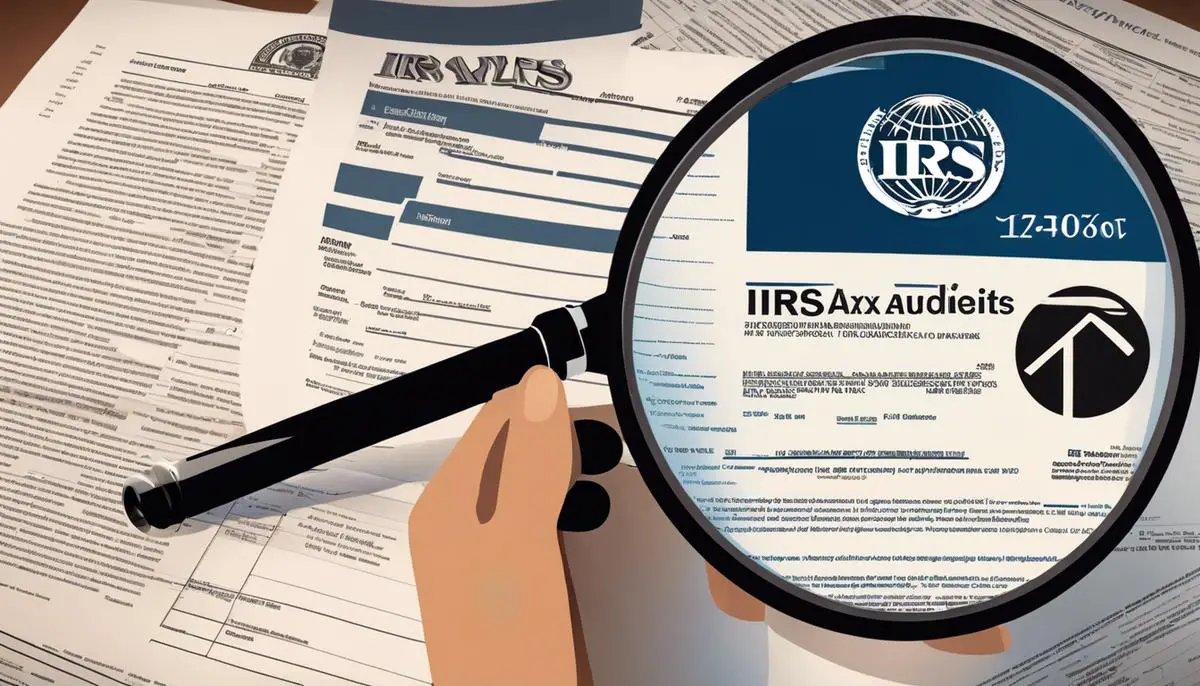Experiencing an IRS tax audit can be a daunting prospect for any individual or business, whether large or small. Yet, understanding the dynamics of audits, knowing what triggers them, and having effective strategies to navigate through them can turn these seemingly intimidating experiences into manageable situations. The following discussion aims to demystify the concept of IRS tax audits, elaborating on their types such as correspondence, office, and field audits and their respective implications. Additionally, it highlights common red flags that could potentially prompt an audit, advising businesses on how to avoid such scenarios. This piece also offers strategic insights on successfully navigating audits and key actions one must undertake post-audit. Armed, thus, with this knowledge, you can shape a responsible taxpayer persona, equipped to handle audits and aware of your rights and obligations.
Understanding IRS Tax Audits
Unraveling the Enigma of IRS Tax Audits: A Stepping Stone to Business Success
Audits strike fear in the hearts of many business owners. Just the mere thought of the IRS scrutinizing their financial records is enough to make them break out in a cold sweat. Yet, understanding audits, in all their intimidating complexity, becomes a vital thread in the fabric of financial literacy for all astute business professionals.
Consider this: IRS tax audits are essentially independent examinations of your tax returns. They are checkpoints, designed to ensure tax law compliance, truthful reporting, and a fair system for all taxpayers. Auditing may not be the most tantalizing aspect of doing business, but it is undoubtedly an integral one.
One of the fundamental elements to grasp about an audit is its selection. Despite urban myths, audits are not random. Instead, they are usually triggered by incongruities in tax returns, inconsistent financial information, or substantial business losses. Sometimes, an audit can be as simple as verifying the accuracy of reported income. It’s about due diligence, which none can deny is a cornerstone of good business.
Another crucial detail to understand about audits is that they’re not allegations of fraud. Many tend to view audits through a lens tinted with notions of crime and punishment. Instead, think of them as a standard procedure, a check-and-balance protocol. It’s healthy to be mindful of audits, but fear has no business here.
Many believe that facing an audit alone is the ‘entrepreneurial’ way. Wrong. Effective delegation isn’t a sign of weakness; it’s a telltale of a smart businessperson. Start-ups to multinationals, no one ventures into an audit without a competent tax professional at the helm. In this high-stakes environment, expertise isn’t optional; it’s a necessity.
Audits can arrive via mail, in-person interviews, or field audits at business premises. Each type requires a different strategy. For instance, correspondence audits can usually be dealt with by mail, while in-person and field audits necessitate a more hands-on approach in gathering and presenting required documents.
Preparation is king when it comes to audits. Knowing the tax laws that apply to your particular industry, solid record-keeping, and a clear understanding of your rights and obligations during the audit will stand you in good stead.
While fines, penalties, and additional tax payments can be outcomes of an audit, the sky does not fall on every audited business. Many audits end in favor of the taxpayer, resolving with no changes or even refunds.
Conclusively, a successful entrepreneur views an audit as an opportunity, a chance to validate their tax strategies, understand potential pitfalls, and improve their financial acumen. In the grand scheme of things, IRS tax audits are not cause for trepidation but a catalyst to spur you on to greater business success and fiscal responsibility. Be informed, prepare, and meet audits head-on – that’s the unwavering ethos of an entrepreneur.

Audit Triggers and Red Flags
Now that we have a comprehensive understanding of the IRS audit mechanism, as well as the right mentality to approach the process, let’s delve into the other essential information – critical triggers and red flags that could potentially lead to an audit. Becoming familiar with these triggers can serve to alert taxpayers and prompt a more careful review of tax returns. Remember, awareness is a key factor in navigating the challenging terrain of tax regulations.
One key trigger to an IRS audit is reporting income discrepancies. Misreporting income is a surefire way to garner the attention of the IRS, as substantial income disparities are automatically flagged in their system. This encompasses all income sources including wages, business revenue, rental income, or even stock transactions. Misalignment between reported income and the information the IRS receives from employers or financial institutions can quickly escalate to an audit.
Another significant red flag is excessive deductions or tax credits. While tax deductions and credits serve as a legitimate means to lower one’s taxable income, an unusually high number or amount can become a trigger for audits. Charity deductions, home office deductions, business expenses, and educational credits are often areas of scrutiny. The key is maintaining a balance – while leveraging these reduces your tax liability, always ensure that they are legitimate and backed up by documentation.
High income earners, generally those with incomes over $1 million, are another group more likely to face an audit. The IRS often targets high net worth individuals because, rightly or wrongly, they are perceived as likely to have more complex financial transactions which may give rise to tax issues. This is not to discourage entrepreneurship or pursuit of wealth but is rather a reminder to ensure meticulous record-keeping and to seek professional advice if dealing with complex returns.
Activities such as running a cash-intensive business or lacking consistent bookkeeping also warrant increased audit attention. Cash transactions are often perceived as difficult to track, inviting IRS scrutiny. Moreover, inconsistent or incomplete records may raise suspicions of inaccurate reporting, prompting an audit.
Lastly, failing to file returns or late filings are other significant red flags for an IRS audit. The IRS is acutely aware of taxpayers who fail to submit their tax returns or consistently file late. These activities not only increase the potential for an audit but are legally punishable offenses with clues for intents to evade taxes.
In conclusion, the best defense against IRS audits lies in accurate reporting, ensuring legitimate deductions, comprehensive record-keeping, and prompt tax return filing. Moreover, professional advice can offer invaluable support. Cautiousness and diligence are the best practices to ensure successful navigation through any potential audits. Learning the landscape of IRS audits empowers taxpayers towards success rather than fearing the IRS. Always remember, knowledge is power – be proactive, not reactive, to secure your financial future.

Strategies for Navigating IRS Audits
Building on what’s already been discussed extends a compelling invitation into an even more nuanced understanding of navigating an IRS audit. Overcoming an audit isn’t an insurmountable task with the right insights.
Firstly, let’s talk about understanding the role of digital footprints. Digital information is increasingly becoming important, and the IRS extends its scrutiny to include digital receipts and expenses. Businesses should ensure they have a clean digital trail, that is, digital records that accord with the paper trail and the declared incomes. This coherence augments your credibility during an audit.
Next, instigating pre-emptive audits can be instrumental. This voluntary, preventive measure can help businesses have a clear self-assessment of their tax situation. By conducting an internal audit, or hiring an external auditor to do so, businesses can gain a direct understanding of any potential red flags which could prompt an IRS audit. This is exactly the kind of strategic planning sophisticated operation demands.
Additionally, businesses need to pay particular attention to international transactions. The IRS pays close attention to these operations due to the potential for tax evasion. Therefore, maintaining appropriate records of overseas transactions is utterly critical.
Moreover, when it comes to employment tax, the IRS has heightened its focus on businesses that classify workers as independent contractors instead of employees. This can result in significant employment tax savings. Businesses should understand the IRS’s view on this and ensure they are not misclassifying employees.
Finally, having a first-rate professional network is indispensable when it comes to navigating tax audits. This network should comprise of corporate attorneys, Certified Public Accountants (CPAs), and even former IRS agents with practical experience. Such a network serves not only as an information resource but can also provide requisite support and insights during an audit.
The challenge of an IRS audit can seem gargantuan. But with strategic measures, in-depth understanding, awareness, and efficient professional help, this challenge can be transformed into a constructive exercise for fiscal amelioration. As we repeatedly discover in the world of business, oftentimes the key to growth lies in facing our challenges head-on, understanding them, and innovating solutions to overcome them. Furthermore, along this journey of IRS audit navigation, you’re creating a more powerful, resilient, and savvy business.
The essence of business success is adaptability and intelligent strategy. Audits need not be a source of apprehension, but rather can serve as a springboard to greater business wisdom. So, fortify your knowledge, strengthen your proactive strategies, and manoeuvre the complexities of an IRS audit like a seasoned expert.

Post-Audit Actions
Moving Forward After an IRS Audit: Confidence in Action
Now that we’ve delineated the requisites of surviving an audit, let’s explore life post-audit. The measures taken after this scrutiny are supremely pivotal – they shape your business’s fiscal future and safeguard it against any comparable instance in the future.
Once the IRS communicates the results of the audit, it’s crucial to review and comprehend them comprehensively. If you disagree with the conclusions, don’t capitulate and accept them. Diplomacy can prevail in seeking resolution. You can request a conference with an IRS manager or leverage the IRS’s Independent Office of Appeals who resolve tax controversies without litigation.
If you find yourself in a position to pay penalties due to the audit’s outcome, remember negotiating isn’t off the table. IRS offers an installment agreement permitting taxpayers to pay their debt in a span and penalty abatement could waive penalties if you indicate plausible causes like illness or unavoidable absence.
Think of audits as a post-graduate course in taxation. Glean learnings and use these to better your reporting. Simplify tax returns where beneficial. Minimizing deductions can reduce the odds of future audits. Heavily document your deductions with clear, concise records, irrefutably establishing their legitimacy.
Rotate your focus onto income sources. Businesses with significant non-wage income, such as rental properties or investments, catch the IRS’s attention. Ensure to provide verifiable documentation for all income sources.
Your professional relationship with your tax advisor shouldn’t necessarily end after the audit. Maintain it for assistance with future tax planning. Were there missteps or deficiencies exposed in the process? If so, partake in the dutiful task of refining and innovating a new approach to prevent recurrence.
Post-audit, retain all related files and documents scrupulously. Keep these records for at least three years, the period within which the IRS usually declares an audit.
Revolutionize your record-keeping. Develop steadfast systems ensuring incomparable accuracy in future dealings. This not only appeases IRS requirements but augments your fiscal administration.
Lastly, take heed to the fact that an audit is not inevitably an adversarial encounter. Instead, it’s a secondary level of financial pertinence— an avenue to fortify fiscal prowess, stride confidently in the business sphere and master the labyrinth of taxation.
In summation, getting audited isn’t an end of the world scenario. Relish the opportunity it presents and acknowledge the strength garnered through traversing tribulations. Bear in mind that your accumulated wisdom is now your most formidable weapon to thrive in the world of business and finance. Move forward with conviction. You’re wiser, stronger, and more resilient than before.

Understanding and managing IRS tax audits is neither an arcane science nor an exercise in futility. Whether you’re a business owner seeking to tighten your audit-proof practices, or an individual navigating your way through an audit, the tactics and information provided herein can prove invaluable. From distinguishing between different types of audits to recognizing audit triggers and mitigating potential red flags, strategic preparedness is crucial. Moreover, having the know-how to navigate the complexity of an audit, and awareness of actions to take post-audit, can soften the blow and mitigate anxiety. Paying taxes, after all, is a shared civic duty, and knowing how to maneuver the system not only benefits you but also contributes to a healthier economy.








